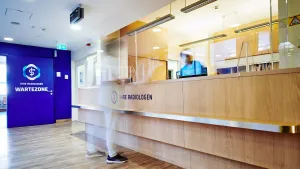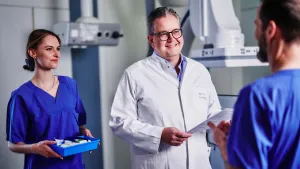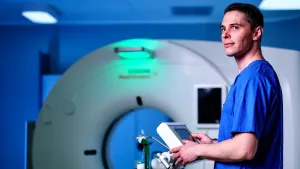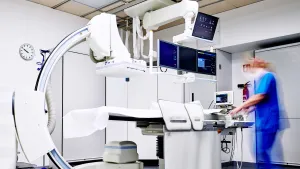
Vascular diagnostics using MRI and CT - Precise analysis of your vessels.
Vascular and Interventional Radiology is a distinct sub-specialty of radiology and one of the most rapidly expanding areas in medicine. It has led the current movement toward minimally invasive and targeted therapy.
Our patient population ranges from childhood to the elderly and includes procedures spanning the full range of the field. We perform both, vascular and non-vascular interventions, such as angioplasty, thrombectomy, stenting, thrombolysis, and embolization as well as pulmonary, renal, biliary, enteric and transplant-related interventions. We have a frequented interventional oncology practice in several hospitals as well, which includes chemoembolization.
We consider ourselves to be one of the leading institutions in vascular medicine in Berlin. We are a training center of the German Society for Interventional Radiology (DeGIR). From the diagnosis of your vascular diseases to minimally invasive therapy, we offer you the whole range of vascular care. Together with our four partner hospitals in Berlin and Brandenburg, we offer the entire spectrum of state-of-the-art diagnostics and excellent therapy of vascular diseases.
United and strong. For your well-being.
We are a member of two interdisciplinary vascular centers (Deutsches Gefäßzentrum Berlin and Gefäßzentrum at Jewish Hospital Berlin) and partner of the stroke unit of the Jewish Hospital Berlin, which is certified as a regional stroke unit. In this regard, we collaborate with specialists in angiology, vascular medicine, vascular surgery, neurology and cardiology to offer highly specialized, individual and guideline-oriented diagnostics and therapy.
Certified expertise.
Our specialists Prof. Brechtel and Prof. Ketelsen are certified interventional radiologists of the German Society for Interventional Radiology (DeGIR) and have a proven expertise in the field of minimally invasive therapies. Current research projects of our radiological imaging centers and countless scientific publications in renowned international journals (e.g. Lancet) underline our qualification.
Our focus.
Diagnostics of vascular diseases.
Highly qualified duplex sonography and vascular imaging using CT and MRI (CT angiography, MR angiography) of all body regions. We will be happy to advise you comprehensively on therapeutic options.
Minimally invasive therapy of peripheral arterial occlusive disease (PAOD).
Intermittent claudication, is a symptom that describes muscle pain on mild exertion classically in the calf muscle, which occurs during exercise, such as walking, and is relieved by a short period of rest. Most commonly, intermittent vascular claudication is due to peripheral arterial disease which implies significant atherosclerotic blockages resulting in arterial insufficiency. In the worst case, these deposits lead to severe vascular narrowing or occlusions and cause ulcers ("non-healing wounds"). We perform state-of-the-art minimally invasive therapies by widening these stenoses and using stents if necessary. This is usually done under local anesthesia. If this procedure is not suitable for you, we will be happy to advise you, together with our corporate partners, on which open surgical procedures are suitable for you.
Minimally invasive therapy of narrowed dialysis shunts.
At St. Joseph Hospital Berlin we work closely with the largest non-university nephrology department in Berlin. Dialysis shunts can become constricted, which results in reduced blood flow in the shunt, being no longer sufficient for dialysis. In order to avoid a complete shunt occlusion, we offer minimally invasive therapies in which the narrowed area is expanded by means of a balloon catheter until the flow is sufficiently restored again. If this procedure should not be sufficient, a vascular surgeon experienced in shunt surgery from our clinical cooperation partner will of course be available as your contact.
Minimally invasive therapy of stenoses of the brain-supplying arteries.
Narrowing of the arteries that supply the brain (e.g. internal carotid artery) is a common disease location in patients with atherosclerosis. In order to avoid a stroke, a high-grade stenosis of the carotid artery requires treatment. We offer minimally invasive therapies in which a stent is implanted into the carotid artery via a small access in the groin. Since not all plaque stenoses are amendable for this treatment method, we cooperate closely with our colleagues from vascular surgery department in cases where open surgical therapy is a better option.
Stroke treatment by intracranial thrombectomy.
Together with our partner, the Jewish Hospital Berlin, we specialize in the treatment of acute strokes. As part of an interdisciplinary team, we are responsible for round-the-clock diagnostics and mechanical recanalization. This means that in special emergent situations we attempt to remove the blood clot in your brain by mechanical thrombectomy. If the treatment is performed early after onset of the first symptoms, it is more likely that permanent damages will remain minimal.





